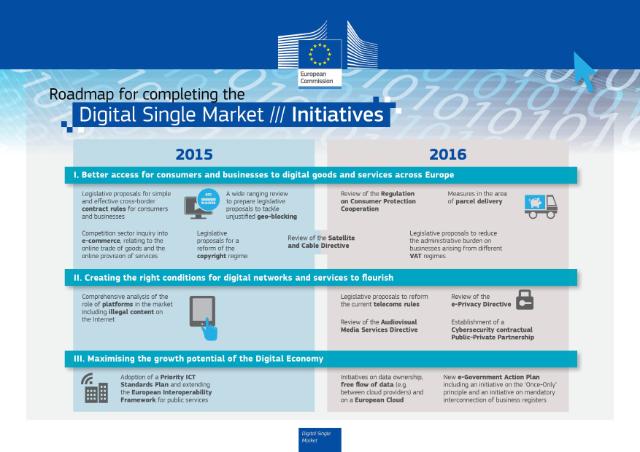European digital associations call for a future-oriented Digital Single Market.
The associations of the digital economy in the UK, France and Germany are calling on the European Commission, in implementing the strategy for the digital single market, to focus on trade, free data flows, innovation and closer cooperation.
The three European digital associations, BITKOM (D), techUK (GB), and Syntec numerique want (F) an innovation-friendly Digital Single Market
The digital associations techUK, Syntec Numérique and Bitköm believe a Digital Single Market, which is future-oriented and based on innovation, is clearly in the interest of consumers and businesses in Europe. They are concerned that current proposals have deviated from that goal in many areas. These recently published proposals according to the digital associations prescribe many rules and standards and do not rely on the advantages of the digital revolution. In July 2015, techUK, Syntec Numérique and Bitkom, representing together more than 5,000 tech companies with more than 1.9 million employees, published eight principles with which the Digital Single Market could give a boost for jobs and growth.
Regardless of the future relationship of Britain with the EU, techUK, Syntec Numérique and Bitkom are calling on the Commission, in implementing the strategy for the digital single market, to focus on trade, free data flows, innovation and closer cooperation.
Towards a genuine internal market
Notwithstanding the progress made so far, much more needs to be done, according to the associations, in order to achieve a genuine internal market which creates innovation and jobs.
Currently, the Commission seems to have come off this path in several areas, among others in duplication of data protection rules in the review of the Electronic Privacy Directive and proposals that could undermine linking freedom by new forms of ancillary copyright. These plans, which are to be completed in the coming months, are hostile to innovation and are threatening to harm the digital economy, instead of supporting them. The three organisations also argue in favour of a future-proof regulatory framework for telecommunications, which ensures fair competition and adequate consumer protection.
The Commission should recognise that platform companies deliver growth and therefore should not yield to protectionist reflexes in cross-border data flows. In addition, the three organisations recommend that the Commission studies the impacts across the board of new legal concepts, such as data ownership. This could have a negative impact on Europe's potential in the digital economy. Data and trade go hand-in-hand in today's global economy and data-driven innovation is only possible where many kinds of data can securely and freely flow across borders.
The associations of the digital economy in the UK, France and Germany are calling on the European Commission, in implementing the strategy for the digital single market, to focus on trade, free data flows, innovation and closer cooperation.
The three European digital associations, BITKOM (D), techUK (GB), and Syntec numerique want (F) an innovation-friendly Digital Single Market
The digital associations techUK, Syntec Numérique and Bitköm believe a Digital Single Market, which is future-oriented and based on innovation, is clearly in the interest of consumers and businesses in Europe. They are concerned that current proposals have deviated from that goal in many areas. These recently published proposals according to the digital associations prescribe many rules and standards and do not rely on the advantages of the digital revolution. In July 2015, techUK, Syntec Numérique and Bitkom, representing together more than 5,000 tech companies with more than 1.9 million employees, published eight principles with which the Digital Single Market could give a boost for jobs and growth.
Regardless of the future relationship of Britain with the EU, techUK, Syntec Numérique and Bitkom are calling on the Commission, in implementing the strategy for the digital single market, to focus on trade, free data flows, innovation and closer cooperation.
Towards a genuine internal market
Notwithstanding the progress made so far, much more needs to be done, according to the associations, in order to achieve a genuine internal market which creates innovation and jobs.
Currently, the Commission seems to have come off this path in several areas, among others in duplication of data protection rules in the review of the Electronic Privacy Directive and proposals that could undermine linking freedom by new forms of ancillary copyright. These plans, which are to be completed in the coming months, are hostile to innovation and are threatening to harm the digital economy, instead of supporting them. The three organisations also argue in favour of a future-proof regulatory framework for telecommunications, which ensures fair competition and adequate consumer protection.
The Commission should recognise that platform companies deliver growth and therefore should not yield to protectionist reflexes in cross-border data flows. In addition, the three organisations recommend that the Commission studies the impacts across the board of new legal concepts, such as data ownership. This could have a negative impact on Europe's potential in the digital economy. Data and trade go hand-in-hand in today's global economy and data-driven innovation is only possible where many kinds of data can securely and freely flow across borders.

Comments
Post a Comment